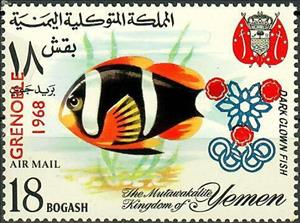Stamp: Dark Clown Fish (Amphiprion clarkii) (Yemen, Kingdom 1968)
Dark Clown Fish (Amphiprion clarkii) (Yemen, Kingdom 1968)
01 January (Yemen, Kingdom ) within release Winter Olympics in Grenoble goes into circulation Stamp Dark Clown Fish (Amphiprion clarkii) face value 18 Yemeni buqsha
| Stamp Dark Clown Fish (Amphiprion clarkii) in catalogues | |
|---|---|
| Michel: | Mi: YE-K 444IA |
Stamp is horizontal format.
Red overprint upright on the left: GRENOBLE 1968Also in the issue Winter Olympics in Grenoble:
- Souvenir Sheet - Butterfly Fish - Grenoble 1968 Overprint face value 10;
- Stamp - Cuckoo Wrasse (Labrus mixtus) face value 14;
- Stamp - Dark Clown Fish (Amphiprion clarkii) face value 18;
- Stamp - Deepwater Squirrelfish (Sargocentron bullisi) face value 16;
- Stamp - Dragon Fish (Pterois sp.) face value 24;
- Stamp - Spotted Coral Grouper (Plectropomus maculatus) face value 34;
- Stamp - Violet-hued Berycid (Beryx decadactylus) face value 12;
- Stamp - Dark Clown Fish (Amphiprion clarkii) face value 6;
- Stamp - Hooded Butterflyfish (Chaetodon larvatus) face value ½;
- Stamp - Lionfish (Pterois sp.) face value 4;
- Stamp - Rudder Fish (Kyphosus sp.) face value ¼;
- Stamp - Spotted Coral Grouper (Plectropomus maculatus) face value 1;
- Stamp - Violet-hued Berycid (Beryx decadactylus) face value 10;
- Stamp - Yellowmargin Triggerfish (Pseudobalistes flavimarginatus) face value ⅛;
Stamp Dark Clown Fish (Amphiprion clarkii) it reflects the thematic directions:
Animals are multicellular, eukaryotic organisms of the kingdom Animalia (also called Metazoa). All animals are motile, meaning they can move spontaneously and independently, at some point in their lives. Their body plan eventually becomes fixed as they develop, although some undergo a process of metamorphosis later on in their lives. All animals are heterotrophs: they must ingest other organisms or their products for sustenance.
A fish is any member of a group of animals that consist of all gill-bearing aquatic craniate animals that lack limbs with digits. They form a sister group to the tunicates, together forming the olfactores. Included in this definition are the living hagfish, lampreys, and cartilaginous and bony fish as well as various extinct related groups. Tetrapods emerged within lobe-finned fishes, so cladistically they are fish as well. However, traditionally fish are rendered obsolete or paraphyletic by excluding the tetrapods (i.e., the amphibians, reptiles, birds and mammals which all descended from within the same ancestry). Because in this manner the term "fish" is defined negatively as a paraphyletic group, it is not considered a formal taxonomic grouping in systematic biology. The traditional term pisces (also ichthyes) is considered a typological, but not a phylogenetic classification. The earliest organisms that can be classified as fish were soft-bodied chordates that first appeared during the Cambrian period. Although they lacked a true spine, they possessed notochords which allowed them to be more agile than their invertebrate counterparts. Fish would continue to evolve through the Paleozoic era, diversifying into a wide variety of forms. Many fish of the Paleozoic developed external armor that protected them from predators. The first fish with jaws appeared in the Silurian period, after which many (such as sharks) became formidable marine predators rather than just the prey of arthropods. Most fish are ectothermic ("cold-blooded"), allowing their body temperatures to vary as ambient temperatures change, though some of the large active swimmers like white shark and tuna can hold a higher core temperature. Fish are abundant in most bodies of water. They can be found in nearly all aquatic environments, from high mountain streams (e.g., char and gudgeon) to the abyssal and even hadal depths of the deepest oceans (e.g., gulpers and anglerfish). With 33,100 described species, fish exhibit greater species diversity than any other group of vertebrates. Fish are an important resource for humans worldwide, especially as food. Commercial and subsistence fishers hunt fish in wild fisheries (see fishing) or farm them in ponds or in cages in the ocean (see aquaculture). They are also caught by recreational fishers, kept as pets, raised by fishkeepers, and exhibited in public aquaria. Fish have had a role in culture through the ages, serving as deities, religious symbols, and as the subjects of art, books and movies.
The modern Olympic Games or Olympics (French: Jeux olympiques) are leading international sporting events featuring summer and winter sports competitions in which thousands of athletes from around the world participate in a variety of competitions. The Olympic Games are considered the world's foremost sports competition with more than 200 nations participating. The Olympic Games are held every four years, with the Summer and Winter Games alternating by occurring every four years but two years apart.
Sport is a form of physical activity or game. Often competitive and organized, sports use, maintain, or improve physical ability and skills. They also provide enjoyment to participants and, in some cases, entertainment to spectators. Many sports exist, with different participant numbers, some are done by a single person with others being done by hundreds. Most sports take place either in teams or competing as individuals. Some sports allow a "tie" or "draw", in which there is no single winner; others provide tie-breaking methods to ensure one winner. A number of contests may be arranged in a tournament format, producing a champion. Many sports leagues make an annual champion by arranging games in a regular sports season, followed in some cases by playoffs.




